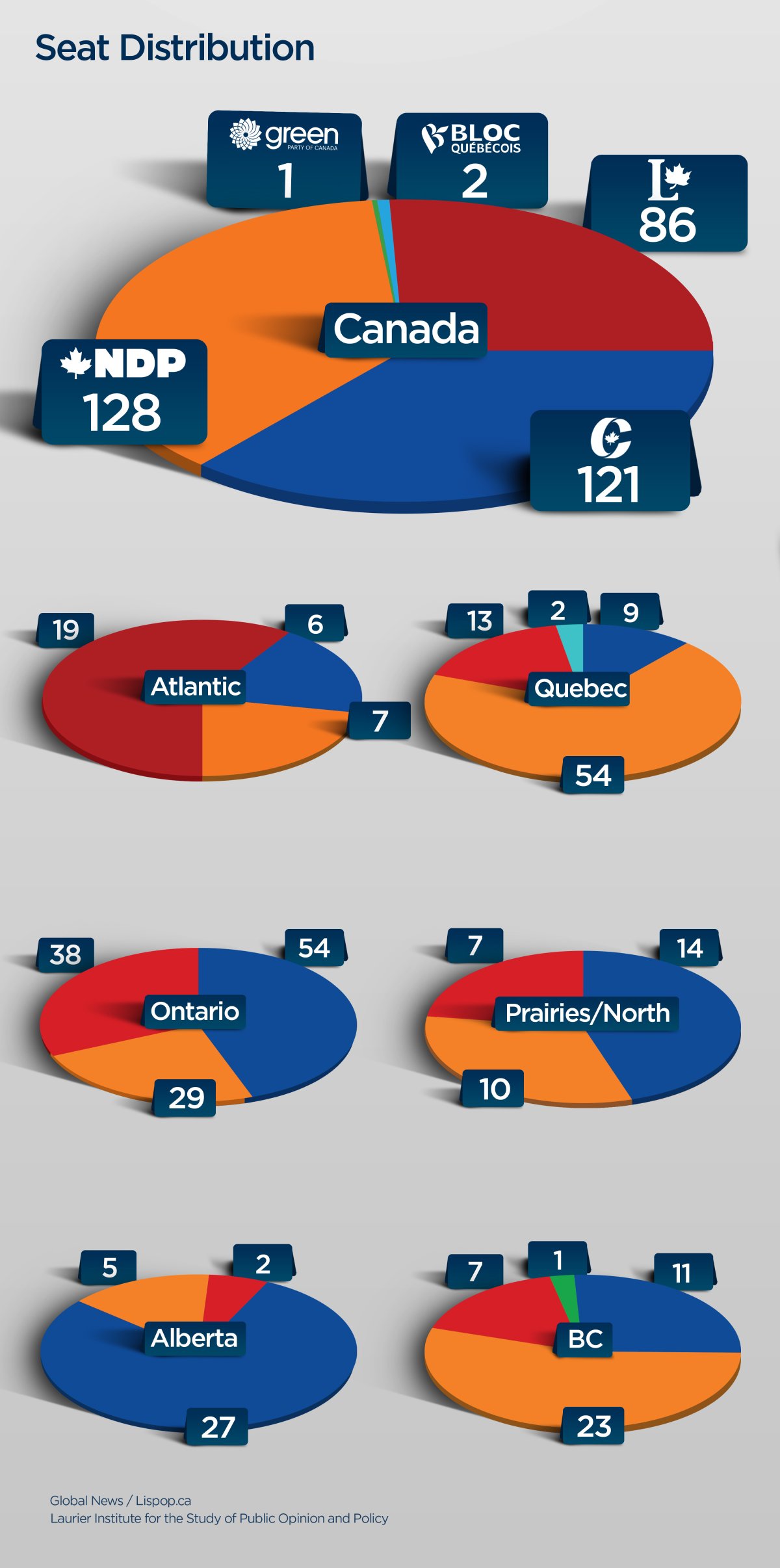TORONTO – It’s been a little over a week since the start of Canada’s federal election campaign and the latest seat projections continue to show a tight race with the NDP, led by Tom Mulcair, holding a small lead over Stephen Harper’s Conservatives.

The new numbers, provided to Global News by the Laurier Institute for the Study of Public Opinion and Policy (LISPOP), see the NDP winning 128 seats, Harper and the Conservatives at 121 and Justin Trudeau’s Liberals at 86, if an election were held today.
READ MORE: Tories lead on the economy, NDP on health care, cost of living
The seat projections from LISPOP are similar to their previous numbers that saw the NDP with 129, the Tories with 118, and Liberals with 85. Elizabeth May’s Green Party continue to remain at one seat. And little has shifted looking at the voting breakdown across Canada.
LISPOP’s projections are based on a blended sample of polls between July 22 and August 10, among approximately 8,000 new respondents.
“Public opinion isn’t always changing dramatically. Now we have had two months where things haven’t changed,” said Barry Kay, a politics professor at Wilfrid Laurier University. “It’s really a pick in between the NDP and the Conservatives in terms of seats.”
WATCH: Weighing in on the federal election so far
Kay said one thing the numbers do show is that none of the three major parties are approaching majority territory of forming government.
“It’s a very uneven election in terms of what the measurement of victory is,” said Kay. “Normally one thinks that coming first in terms of seats is a victory, but Harper can’t just come first. He needs a majority.”
The NDP and the Liberals could defeat a Harper minority government just as the Liberals, NDP and Bloc tried to defeat Harper’s newly elected Conservatives in 2008 when they brought in a budget the opposition felt failed to deal with the global economic crisis. Harper avoided a confidence vote by convincing the Governor General to prorogue Parliament.
- What is a halal mortgage? How interest-free home financing works in Canada
- Capital gains changes are ‘really fair,’ Freeland says, as doctors cry foul
- Ontario doctors offer solutions to help address shortage of family physicians
- Canada will take bigger economic hit than U.S. if Trump wins election: report
“The goal for the conservatives is to get 170 seats and they are nowhere near that,” said Kay. “If I was inclined to bet, I don’t think anyone is going to be at a majority unless there was a dramatic breakthrough in someone’s comfort area.”
One issue that has yet to play out is how the trial of disgraced Senator Mike Duffy will affect the minds of voters during the marathon 11-week campaign.
The trial resumed Wednesday with Harper’s former chief of staff Nigel Wright taking the stand to answer questions about whether Harper knew about a $90,000 cheque Wright paid Duffy to cover his dubious expense claims.
READ MORE: Leaders’ debate, attack ads and a week of campaigning have little effect on voters, Ipsos poll shows
“Anything about the Duffy trial is bad for the Conservatives. How bad? It’s not so clear,” said Kay.
“The problem with the Duffy trial is that it reminds the public of an area the Conservatives haven’t done well on and that’s Senate appointments.”
Other embattled Senators include Patrick Brazeau, Pamela Wallin and Sen. Don Meredith, who became another blemish on Harper’s record when allegations of sexual relations with a minor surfaced in June.






Comments